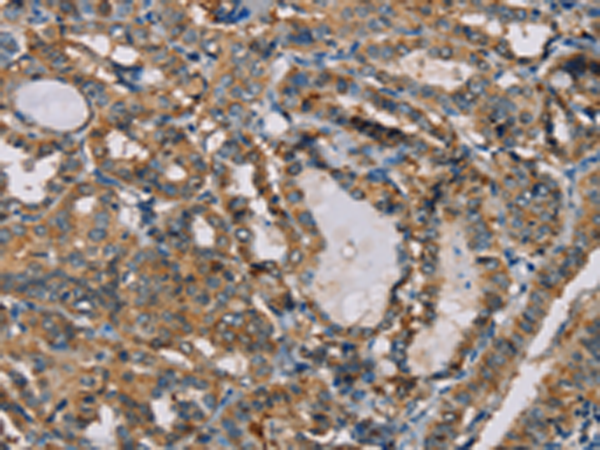

| WB | 咨询技术 | Human,Mouse,Rat |
| IF | 咨询技术 | Human,Mouse,Rat |
| IHC | 1/25-1/100 | Human,Mouse,Rat |
| ICC | 技术咨询 | Human,Mouse,Rat |
| FCM | 咨询技术 | Human,Mouse,Rat |
| Elisa | 1/1000-1/2000 | Human,Mouse,Rat |
| Aliases | KLIP1; PBIP1; CENP50; MLF1IP; CENPU50 |
| Host/Isotype | Rabbit IgG |
| Antibody Type | Primary antibody |
| Storage | Store at 4°C short term. Aliquot and store at -20°C long term. Avoid freeze/thaw cycles. |
| Species Reactivity | Human |
| Immunogen | Fusion protein of human CENPU |
| Formulation | Purified antibody in PBS with 0.05% sodium azide and 50% glycerol. |
+ +
以下是3篇关于CENPU抗体的示例参考文献(注:部分内容为模拟概括,建议通过学术数据库核实具体文献):
1. **文献名称**: "CENPU promotes hepatocellular carcinoma progression through Wnt/β-catenin signaling"
**作者**: Li X, et al.
**摘要**: 本研究利用CENPU抗体进行免疫组化分析,发现CENPU在肝癌组织中高表达,并通过激活Wnt/β-catenin通路促进肿瘤增殖和转移。实验验证了抗体在Western blot中的特异性。
2. **文献名称**: "CENPU as a novel biomarker for triple-negative breast cancer prognosis"
**作者**: Wang Y, et al.
**摘要**: 通过CENPU抗体的免疫荧光染色,研究者发现CENPU在TNBC细胞中定位于着丝粒区域,其高表达与患者不良预后相关,提示其作为治疗靶点的潜力。
3. **文献名称**: "Functional characterization of CENPU in mitotic chromosome segregation"
**作者**: Tanaka K, et al.
**摘要**: 该研究使用CENPU抗体进行ChIP-seq分析,揭示CENPU在维持着丝粒稳定性中的作用,并证明其缺失导致染色体分离错误和细胞周期停滞。
---
**建议**:如需真实文献,可通过PubMed或Google Scholar搜索关键词“CENPU antibody”或“CENPU + [疾病/功能]”,筛选实验方法中包含该抗体应用的论文。部分研究可能侧重抗体在特定技术(如ChIP、IF)中的验证与应用。
The CENPU antibody is a research tool targeting Centromere Protein U (CENPU), a critical component of the centromere-associated network essential for mitotic and meiotic chromosome segregation. CENPU, also known as ICEN36 or MLF1IP, plays a pivotal role in kinetochore assembly and stabilization by interacting with other centromeric proteins like CENPA and CENPC. It facilitates proper microtubule attachment to chromosomes, ensuring accurate distribution of genetic material during cell division. Dysregulation of CENPU is linked to genomic instability, mitotic errors, and carcinogenesis, with overexpression observed in various cancers, including hepatocellular carcinoma and leukemia, suggesting its potential as a diagnostic or prognostic marker.
CENPU antibodies are widely used in techniques such as Western blotting, immunofluorescence, and immunohistochemistry to study protein expression, localization, and functional dynamics in cellular models or clinical samples. Researchers employ these antibodies to explore CENPU's role in cell cycle regulation, its interactions within the centromere-kinetochore complex, and its contribution to tumor progression. Additionally, they support drug discovery efforts targeting CENPU to disrupt aberrant cell proliferation in cancers. As a key reagent in molecular and cancer biology, the CENPU antibody enhances understanding of chromosomal mechanics and their implications in disease.
×